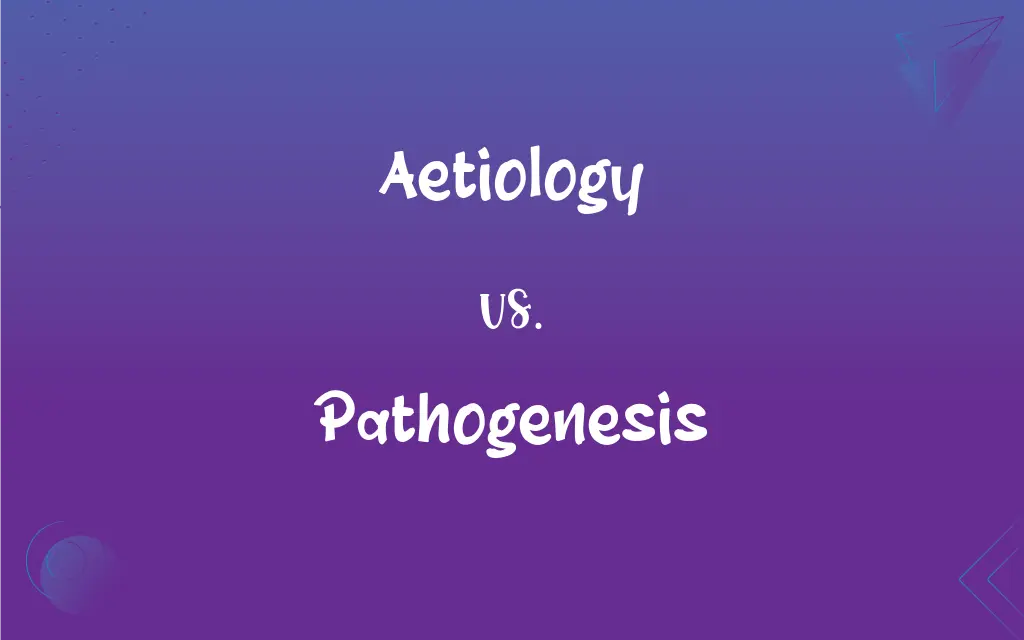Aetiology vs. Pathogenesis: What's the Difference?
Edited by Harlon Moss || By Janet White || Updated on October 6, 2023
Aetiology studies the causes or origins of diseases, while pathogenesis investigates the development and effects of diseases.

Key Differences
Aetiology and pathogenesis are terms used in medical science to study diseases. Aetiology primarily focuses on identifying the causes or origins of diseases. It examines the various factors, like environmental, genetic, and infectious, that can lead to the occurrence of diseases. It is crucial in determining the source or reason behind a disease to formulate effective preventive measures. Pathogenesis, on the other hand, delves into the mechanisms and processes by which a disease develops and progresses. It seeks to understand the sequence of events that occur from the initial contact with an agent causing disease to the ultimate clinical manifestations.
Aetiology takes into account a multitude of factors that can be attributed to the onset of a disease. These factors can be biological, such as pathogens; physical, like trauma; chemical, including toxins; or they can be due to a person’s lifestyle and genetic predisposition. This study of causation or origination is vital for health professionals to prevent the incidence of diseases by addressing the underlying causes. In contrast, pathogenesis explores the biological or molecular mechanisms that lead to the development of pathological conditions or diseases. It enables the understanding of the stages and patterns of disease development and is crucial in designing therapeutic interventions.
While aetiology provides insights into the ‘why’ and ‘how’ of disease occurrence, revealing the reasons behind the existence of diseases, pathogenesis offers an understanding of ‘what’ happens during the disease process. Aetiology seeks to establish causal relationships and risk factors associated with diseases, aiming to understand the specific causes and their contributions to disease development. Pathogenesis maps the progress of diseases, analyzing how they evolve and affect the body, allowing for the study of the complex interactions between a disease’s causal agent and the host.
Aetiology, by determining the causes of diseases, enables the development of preventive strategies and guides health policies to reduce the prevalence of diseases. The knowledge derived from aetiology helps in creating public health strategies to mitigate the risk of disease occurrence. Pathogenesis, by understanding the development of diseases, facilitates the formulation of treatment approaches. Knowing how a disease develops and manifests helps in identifying potential therapeutic targets and devising strategies to intervene or halt the progress of diseases.
In summary, aetiology and pathogenesis are integral components of medical research. Aetiology elucidates the origins and causes of diseases, paving the way for preventive measures, while pathogenesis explains the development and progression of diseases, forming the basis for therapeutic interventions.
ADVERTISEMENT
Comparison Chart
Focus
Causes or origins of diseases.
Development and progression of diseases.
Purpose
To understand why and how diseases occur.
To understand what happens during the disease process.
Role in Medical Science
Aids in formulating preventive measures and guides health policies.
Helps in devising therapeutic interventions and treatment approaches.
Study Involvement
Involves studying environmental, genetic, infectious, and other factors.
Involves studying biological and molecular mechanisms of diseases.
Impact on Healthcare
Facilitates the development of strategies to reduce the prevalence of diseases.
Enables the identification of therapeutic targets to treat diseases.
ADVERTISEMENT
Aetiology and Pathogenesis Definitions
Aetiology
Aetiology is the study of the causes or origins of diseases.
Understanding the aetiology of a disease is crucial for its prevention and treatment.
Pathogenesis
Pathogenesis maps the progress and effects of diseases on the body.
Studying the pathogenesis of mental health disorders is crucial for creating effective interventions.
Aetiology
Aetiology determines the causal relationships and risk factors associated with diseases.
The aetiology of diabetes includes lifestyle, genetics, and environmental factors.
Pathogenesis
Pathogenesis examines the biological or molecular mechanisms leading to pathological conditions.
Research on the pathogenesis of heart disease has led to advances in treatment options.
Aetiology
Aetiology investigates the reasons behind the existence of diseases.
Researchers are exploring the aetiology of Alzheimer's to find effective preventive measures.
Pathogenesis
Pathogenesis analyzes how diseases evolve and affect the host’s body.
In-depth studies into the pathogenesis of viruses aid in the development of antiviral medications.
Aetiology
Aetiology provides insights into the ‘why’ and ‘how’ of disease occurrence.
Studying the aetiology of infectious diseases helps in developing vaccines.
Pathogenesis
Pathogenesis is the process by which a disease develops and progresses.
Understanding the pathogenesis of a condition is essential for developing targeted therapies.
Aetiology
Variant of etiology.
Pathogenesis
Pathogenesis describes the mechanisms and sequence of events leading to diseases.
The pathogenesis of autoimmune diseases involves the immune system attacking healthy cells.
Aetiology
The establishment of a cause, origin, or reason for something.
Pathogenesis
The development of a diseased or morbid condition.
Aetiology
The study of causes or causation.
Pathogenesis
The origin and development of a disease.
Aetiology
The study or investigation of the causes of disease; a scientific explanation for the origin of a disease.
Pathogenesis
The mechanism whereby something causes a disease.
Aetiology
A cause of disease or of any particular case of a disease .
Pathogenesis
Pathogeny.
Aetiology
The science, doctrine, or demonstration of causes; esp., the investigation of the causes of any disease; the science of the origin and development of things.
Pathogenesis
The origination and development of a disease
Aetiology
The assignment of a cause.
Aetiology
The cause of a disease
Aetiology
The philosophical study of causation
Aetiology
Aetiology examines the factors contributing to the occurrence of diseases.
The aetiology of cancer is multifactorial, involving genetic and environmental elements.
FAQs
Does Pathogenesis study the causes of diseases?
No, pathogenesis studies the development and progression of diseases, not their causes.
Can Aetiology include genetic factors?
Yes, aetiology examines all contributing factors, including genetic ones.
Is Pathogenesis important for treatment development?
Yes, understanding pathogenesis is crucial for developing targeted treatments for diseases.
Does Pathogenesis involve studying the immune system?
Yes, pathogenesis often involves studying the role of the immune system in disease development.
Does Aetiology study environmental factors?
Yes, aetiology studies environmental, genetic, infectious, and many other factors related to diseases.
Can Aetiology lead to the development of vaccines?
Indeed, aetiology can lead to vaccine development by identifying the causes of infectious diseases.
Is Aetiology only about infectious diseases?
No, aetiology studies the causes of various diseases, including infectious, genetic, and lifestyle-related ones.
Can Pathogenesis offer insights into disease prevention?
Understanding pathogenesis can indirectly aid in disease prevention by revealing how diseases develop.
Is lifestyle a subject of study in Aetiology?
Absolutely, lifestyle is a significant factor studied in aetiology.
Is understanding Aetiology crucial for public health policies?
Absolutely, understanding aetiology is fundamental in shaping effective public health policies.
Is the study of Pathogenesis limited to chronic diseases?
No, pathogenesis studies both chronic and acute diseases.
Does Aetiology offer insights into disease prevention?
Yes, by understanding the causes of diseases, aetiology offers vital insights into disease prevention.
Is Pathogenesis only related to pathological conditions?
While primarily associated with pathological conditions, pathogenesis also studies normal physiological processes.
Does Aetiology contribute to therapeutic advancements?
Understanding aetiology indirectly contributes to therapeutic advancements by elucidating disease causes.
Can Pathogenesis study be applied to mental health conditions?
Yes, studying pathogenesis is critical for understanding and treating mental health conditions.
About Author
Written by
Janet WhiteJanet White has been an esteemed writer and blogger for Difference Wiki. Holding a Master's degree in Science and Medical Journalism from the prestigious Boston University, she has consistently demonstrated her expertise and passion for her field. When she's not immersed in her work, Janet relishes her time exercising, delving into a good book, and cherishing moments with friends and family.
Edited by
Harlon MossHarlon is a seasoned quality moderator and accomplished content writer for Difference Wiki. An alumnus of the prestigious University of California, he earned his degree in Computer Science. Leveraging his academic background, Harlon brings a meticulous and informed perspective to his work, ensuring content accuracy and excellence.































































